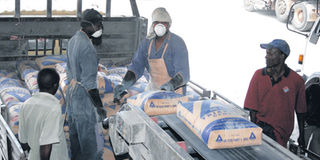Portland eyes 10pc annual growth

Workers loading bags of cement at East Africa Portland Cement at Athi River factory. The firm seeks to double its production in five years. PHOTO | FILE
What you need to know:
- This comes after a drawn-out boardroom wrangle that has seen the firm’s output drop in the last three years.
- East African Portland Cement Company is seeking to shake off the dust from court battles over the control of the Athi River-based firm.
- Since late 2011, Portland has been entangled in boardroom woes over the control of the cement company.
Kenya’s second largest cement manufacturer has embarked on a revival plan to step up production and capture new market.
This comes after a drawn-out boardroom wrangle that has seen the firm’s output drop in the last three years.
East African Portland Cement Company is seeking to shake off the dust from court battles over the control of the Athi River-based firm.
The cement maker has since appointed a new board, comprising two independent directors. This has opened a new chapter in the firm.
Portland chief executive Kephar Tande said the new structure is meant to improve the shareholder relationship.
The fresh strategy would also focus on stepping up efficiency with a view to achieve 10 per cent growth per year, Mr Tande notes.
“We believe this growth will be brought about by the government’s infrastructure development programmes and the growth in the construction industry. The revival plan will also include a technical assistance contract between Lafarge SA (France) and Portland with the purpose of using Lafarge’s technical expertise to improve technical and maintenance issues of the plant and machinery,” said Mr Tande.
The company aims at doubling cement production in the next five years, said the CEO, adding that the firm is optimistic of increased market penetration with products such as ready-mix and pre-cast concrete.
BOARDROOM DRAMA
Last month, Portland held its annual general meeting in which the board said Kenya’s positive gross domestic product numbers, a stable shilling and improving cost of living would drive the demand for cement.
The company also seeks to take advantage of the booming construction industry in the country to rev up cement sales.
“Our objective, for the next five years, is to double our production capacity and increase market penetration by expanding our product range to include ready-mix and pre-cast concrete” said Mr Tande.
“For 80 years, we have grown alongside Kenya, and we are positioning ourselves for the next 80 years.”
Since late 2011, Portland has been entangled in boardroom woes over the control of the cement company.
As a consequence, the firm temporarily halted production in a standoff following the suspension of the board by the then Industrialisation minister Amason Kingi. This resulted in the loss of millions of shillings in revenue.
Workers’ protest
The board was, however, reinstated by the court sparking protests from employees, who were opposed to their return to office. The dispute at the company soon turned political with the local community vowing to ensure the CEO, Mr Tande, was reinstated in office.
Whether the cement firm was a parastatal or not was the subject of intense debate. Those who consider it a parastatal based their view on the combined stake of government (25.3 per cent) and that of the National Social Security Fund (27 per cent), a state agency.
Suspended
French conglomerate Lafarge, which is the world’s largest cement manufacturer, owns a 41.7 per cent stake at Portland and controls 58.6 per cent shareholding in rival — Bamburi Cement.
The rest of the shares are held by the public through the Nairobi Securities Exchange. The wrangles over shareholding structure saw the troubled cement firm suspended by the Capital Markets Authority from trading at the exchange for 60 days.
President Kenyatta last year turned the tide appointing former CMC Motors chief executive Bill Lay to replace Mr Mark ole Karbolo as the board chairman.
_____
2011
Year when boardroom wrangles at Portland Cement erupted
60
Days the cement maker’s stock was suspended from trading at the NSE over shareholding row





